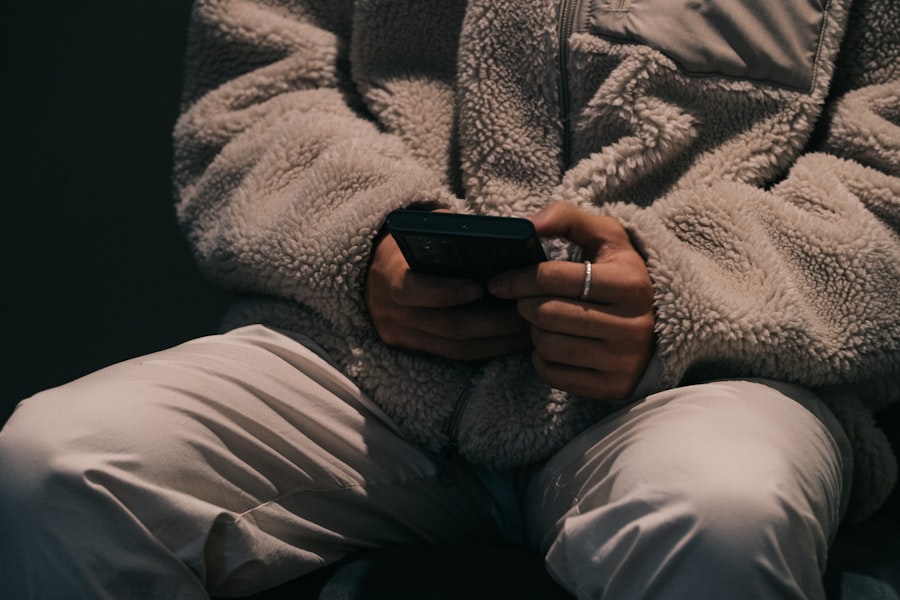In today’s fast-paced world, your smartphone has become an indispensable part of your daily life. You rely on it for communication, information, and entertainment. However, as you scroll through your feeds and check notifications, you may not realize the potential impact this constant connectivity can have on your mental health.
Research has increasingly shown a correlation between excessive phone use and symptoms of depression. The more time you spend glued to your screen, the more isolated you may feel, even when surrounded by friends and family. This paradox of connectivity can lead to feelings of loneliness and despair, as the quality of your interactions often diminishes in favor of digital communication.
You might find yourself reaching for your phone during moments of boredom or stress, seeking solace in the digital world rather than addressing underlying emotions. This cycle can create a feedback loop where your reliance on your device increases, while your mental health deteriorates.
As you become more engrossed in the virtual realm, you may neglect real-life relationships and activities that once brought you joy, further deepening feelings of sadness and isolation.
Key Takeaways
- Excessive phone use is linked to depression, so it’s important to be mindful of our screen time.
- Social media often leads to comparison, which can negatively impact mental health.
- Blue light from screens can disrupt sleep and mood, so it’s important to limit screen time before bed.
- FOMO (fear of missing out) can lead to anxiety, so it’s important to take breaks from social media.
- Cyberbullying can have serious effects on mental health, so it’s important to address and prevent it.
Social Media and Comparison
Social media platforms are designed to showcase the best moments of people’s lives, often leading you to compare your reality with the curated highlights of others. As you scroll through images of friends on exotic vacations or celebrating milestones, it’s easy to feel inadequate or envious. This constant comparison can chip away at your self-esteem and contribute to feelings of depression.
You may find yourself questioning your worth or feeling like you’re falling behind in life, which can lead to a negative self-image and increased anxiety. Additionally, the pressure to present a perfect life online can be overwhelming. You might feel compelled to post only the most flattering photos or share accomplishments, creating a façade that doesn’t reflect your true self.
This dissonance between your online persona and real-life struggles can lead to feelings of shame and isolation. The more you engage in this cycle of comparison, the more difficult it becomes to appreciate your own life and achievements, further fueling depressive thoughts.
The Impact of Screen Time on Mental Health

The amount of time you spend on your phone can significantly affect your mental health. Studies have shown that excessive screen time is linked to increased rates of anxiety and depression. When you spend hours scrolling through social media or binge-watching shows, you may be sacrificing time that could be spent engaging in activities that promote well-being, such as exercise, hobbies, or face-to-face interactions.
This imbalance can lead to a sense of emptiness and dissatisfaction with life. Moreover, the content you consume during screen time can also play a role in shaping your mental state. If you frequently expose yourself to negative news or toxic online environments, it can contribute to feelings of hopelessness and despair.
You might find yourself feeling overwhelmed by the negativity that permeates social media or news outlets, which can further exacerbate any existing mental health issues. It’s essential to be mindful of how much time you spend on your devices and the type of content you engage with to protect your mental well-being.
The Role of Blue Light in Disrupting Sleep and Mood
| Study | Findings |
|---|---|
| Harvard Health Publishing | Exposure to blue light at night can disrupt the body’s natural sleep-wake cycle |
| Journal of Applied Physiology | Blue light exposure can negatively impact mood and cognitive performance |
| University of Toronto | Blue light exposure before bedtime can suppress the production of melatonin, a hormone that regulates sleep |
One often-overlooked aspect of phone use is the impact of blue light on your sleep patterns and mood. The screens of smartphones emit blue light, which can interfere with your body’s natural circadian rhythms. When you use your phone late into the night, the blue light can trick your brain into thinking it’s still daytime, making it difficult for you to fall asleep.
Poor sleep quality is closely linked to mood disorders, including depression and anxiety. If you find yourself tossing and turning at night after a long session on your phone, it’s crucial to recognize how this habit may be affecting your mental health. In addition to disrupting sleep, blue light exposure can also influence your mood during waking hours.
Research suggests that excessive blue light exposure can lead to increased feelings of fatigue and irritability. You may notice that after a long day spent staring at screens, you feel drained and less motivated to engage in activities that typically bring you joy. By being aware of how blue light affects your sleep and mood, you can take proactive steps to limit screen time before bed and create a healthier relationship with technology.
FOMO and Anxiety
The phenomenon known as FOMO—fear of missing out—has become increasingly prevalent in the digital age. As you scroll through social media, it’s easy to feel like everyone else is having fun without you. This fear can lead to heightened anxiety as you constantly check for updates or notifications, worried that you might miss an important event or social gathering.
The pressure to stay connected and involved can be overwhelming, leaving you feeling anxious and restless. FOMO can also create a sense of urgency that drives you to engage with your phone more frequently. You might find yourself attending events not out of genuine interest but rather out of fear that others will have experiences without you.
This behavior can lead to burnout and resentment, as you struggle to keep up with the demands of social media while neglecting your own needs for rest and self-care. Recognizing the impact of FOMO on your mental health is essential for finding balance in a world that often prioritizes constant connectivity.
Cyberbullying and Its Effects on Mental Health

The rise of digital communication has unfortunately also given way to cyberbullying, which can have devastating effects on mental health. If you’ve ever experienced harassment or negative comments online, you know how deeply it can affect your self-esteem and overall well-being. Unlike traditional bullying, cyberbullying can occur 24/7, making it difficult for victims to escape the harassment.
This constant exposure can lead to feelings of helplessness and despair. The emotional toll of cyberbullying is significant; many individuals report experiencing symptoms similar to those found in clinical depression, including sadness, anxiety, and social withdrawal. If you find yourself facing cyberbullying, it’s crucial to seek support from friends, family, or professionals who can help you navigate these challenges.
Remember that no one deserves to be bullied, and taking steps to protect yourself online is essential for maintaining your mental health.
Addiction and Withdrawal Symptoms
As smartphones become more integrated into daily life, many individuals find themselves developing an unhealthy attachment to their devices. You may notice that you feel anxious or irritable when separated from your phone or when unable to check notifications. This dependency can manifest as withdrawal symptoms similar to those experienced by individuals overcoming substance addiction.
If you’ve ever felt compelled to check your phone during conversations or while engaging in other activities, it may be time to evaluate your relationship with technology. Recognizing these signs is the first step toward regaining control over your phone use. You might consider setting specific times during the day when you’ll check your device or implementing app limits to reduce screen time.
By taking proactive measures to address this addiction, you can begin to alleviate withdrawal symptoms and foster healthier habits that prioritize real-life connections over digital distractions.
The Importance of Setting Boundaries with Technology
Establishing boundaries with technology is essential for maintaining a healthy relationship with your devices. You might start by designating specific times during the day when you’ll unplug from your phone entirely—perhaps during meals or before bedtime. By creating these boundaries, you allow yourself the opportunity to engage fully in the present moment without the constant pull of notifications or social media updates.
Additionally, consider curating the content you consume online. Unfollowing accounts that trigger negative emotions or comparison can help create a more positive digital environment. By being intentional about how and when you use technology, you empower yourself to take control over its impact on your mental health.
Seeking Professional Help for Phone-Related Depression
If you find that phone-related issues are significantly impacting your mental health, seeking professional help is a vital step toward recovery. A mental health professional can provide guidance tailored specifically to your situation, helping you develop coping strategies for managing anxiety or depression related to technology use. Therapy can offer a safe space for exploring underlying emotions and behaviors associated with excessive phone use.
In addition to traditional therapy options, support groups focused on technology addiction may also be beneficial. Connecting with others who share similar experiences can provide validation and encouragement as you work toward healthier habits. Remember that seeking help is a sign of strength; taking this step demonstrates a commitment to prioritizing your mental well-being.
Mindfulness and Digital Detox
Incorporating mindfulness practices into your daily routine can help mitigate the negative effects of phone use on mental health. Mindfulness encourages you to be present in the moment rather than getting lost in the digital world. You might try setting aside time each day for mindfulness exercises such as meditation or deep breathing—activities that promote relaxation and self-awareness.
A digital detox can also be an effective way to reset your relationship with technology. Consider taking a break from screens for a weekend or even just a few hours each day. During this time, focus on engaging in activities that nourish your mind and body—such as reading a book, going for a walk in nature, or spending quality time with loved ones—without the distractions of technology.
Finding Balance in the Digital Age
Ultimately, finding balance in the digital age requires intentionality and self-awareness. As technology continues to evolve, it’s essential for you to assess how it fits into your life and what role it plays in shaping your mental health. By recognizing the potential pitfalls associated with excessive phone use—such as depression, anxiety, and addiction—you empower yourself to make informed choices about how you engage with technology.
Striving for balance means prioritizing real-life connections over virtual interactions while also being mindful of how much time you spend on screens each day. By setting boundaries, seeking support when needed, and incorporating mindfulness practices into your routine, you can cultivate a healthier relationship with technology that enhances rather than detracts from your overall well-being in this increasingly digital world.
In today’s digital age, the question “Is my phone making me depressed?” is becoming increasingly relevant as more people find themselves glued to their screens. The constant notifications, social media comparisons, and the pressure to stay connected can take a toll on mental health. For those interested in exploring this topic further, a related article on the impact of technology on mental well-being can be found on the Unplugged Psychology website. This resource delves into the psychological effects of excessive phone use and offers insights into how to manage screen time effectively. You can read more about it by visiting Unplugged Psychology.
LEARN WHY Your Brain Isn’t Addicted to Likes; the Algorithm Gaslights You Daily, Hard.
FAQs
What are the signs of depression?
Some common signs of depression include persistent feelings of sadness, hopelessness, irritability, loss of interest in activities, changes in appetite or weight, difficulty sleeping, and thoughts of self-harm or suicide.
Can excessive phone use contribute to depression?
Excessive phone use, especially on social media, has been linked to feelings of loneliness, comparison, and low self-esteem, which can contribute to depression in some individuals.
How does phone use affect mental health?
Excessive phone use can lead to increased stress, anxiety, and depression. It can also disrupt sleep patterns, which can further impact mental health.
What are some ways to reduce the negative impact of phone use on mental health?
Some ways to reduce the negative impact of phone use on mental health include setting limits on screen time, taking regular breaks from the phone, engaging in offline activities, and seeking support from friends, family, or mental health professionals.
Can using certain features on my phone help improve my mental health?
Some features on phones, such as meditation apps, mood tracking apps, and digital wellness tools, can help individuals manage their mental health and reduce the negative impact of phone use.




